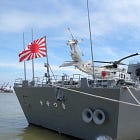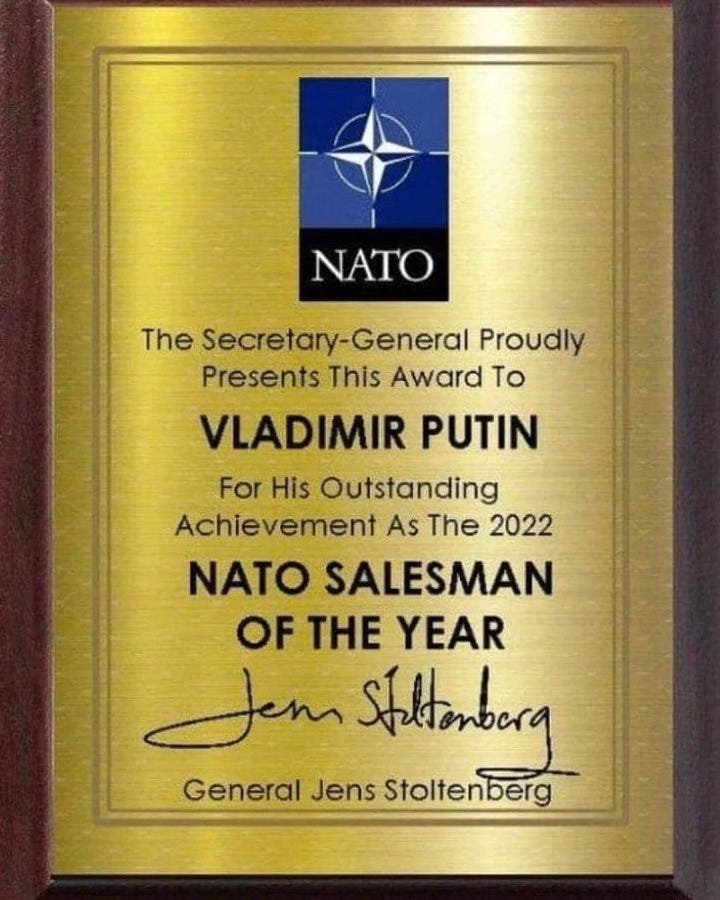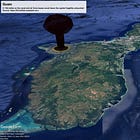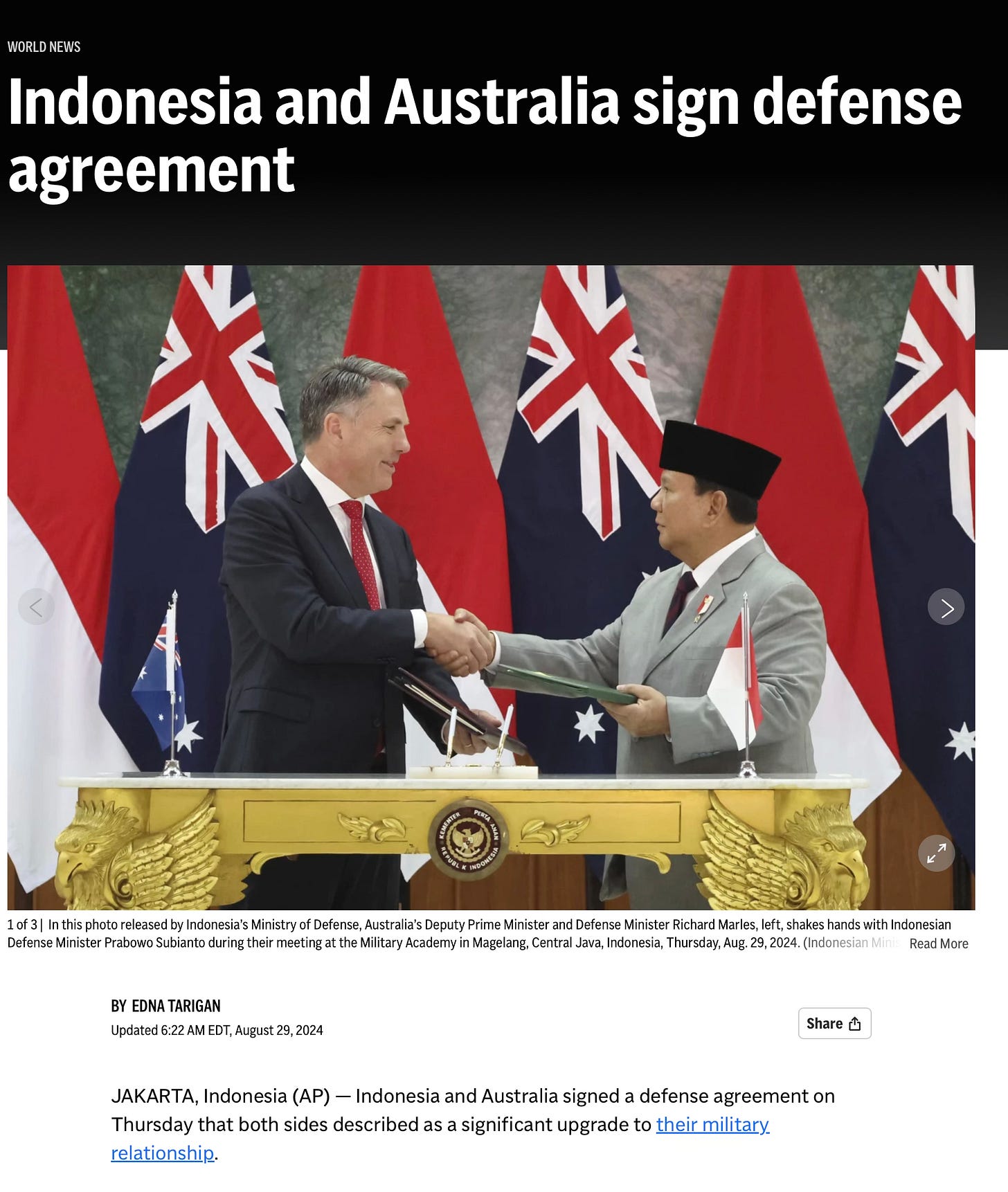An Indo-Australian Strategic Alliance Inches Closer
America's descent into chaos is as strong a driver as China's belligerence
Washington DC 26 Feb 2024
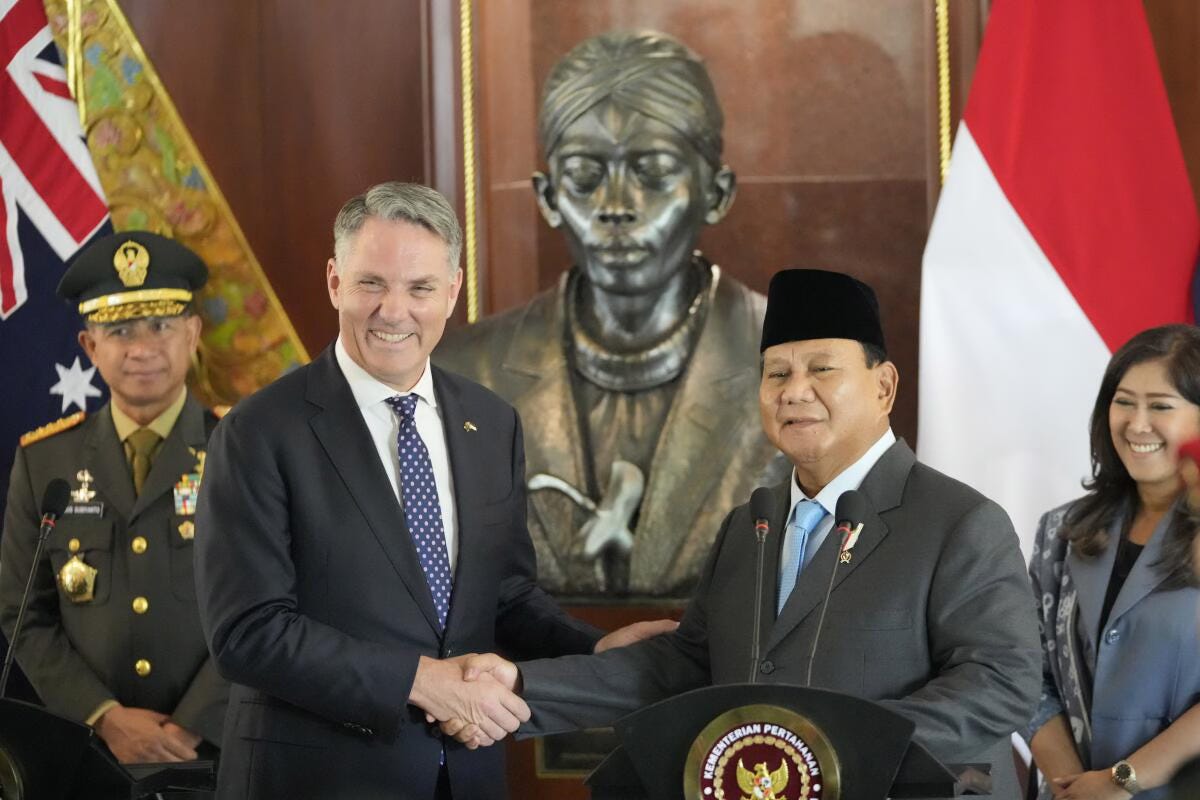
Two years ago Third Offset put forward a rationale for an Australia-Indonesia Strategic Alliance believing it to be inevitable at some point in the near future. AP is reporting that following visits from the Chief of the Australian Defense Force (ADF), the Defense Ministers met Friday to further a new agreement due in the coming months. Australian Defense Minister Marles described the coming pact as “the single deepest and most significant defense cooperation agreement” in the history of the two countries.
This is notable because the Indonesia Defense Minister Prabowo Subianto has just been elected President of Indonesia. A former general and son-in-law of President Soeharto (divorced in 1998 after Soeharto’s fall), President-elect Subianto has a storied past but this will be overlooked by Australia and America due to higher order strategic concerns related to China and the vital role Indonesia could play in an alliance.
When the surprise AUKUS announcement was made, Defense Minister Subianto responded in a unique way - and very differently from Indonesian diplomats who, along with the President, Joko Widodo, “repeatedly and forcefully” raised concerns with their Australian counterparts.
As Third offset wrote two years ago
Recent chirps from the canary in this coal mine includes the following remarkable statement from the Indonesian Defense Minister Prabowo Subianto on the Australian announcement to pursue nuclear powered submarines, something that would have once triggered a crisis in Jakarta.
“But as I said the emphasis of every country is to protect their national interest. If they feel threatened… they will do whatever they can to protect themselves," said Prabowo. “And this is what I mean that we understand that and we respect them.”
Since the announcement in 2021, President Widodo has significantly shifted his views inline with Subianto’s thinking. This transformation has been ably assisted by China and its constant patrols in and around the Natuna Islands - including 6 ships during the week of the AUKUS announcement.
Strategic Alliance or just another Agreement?
The new deal will be an opportunity for the Indonesian President-elect to have a showcase event with his Australian counterpart to kick-off a new era in relations. Since the Bali bombings, Australia and Indonesia have generally become a lot closer. There have been occasional flare ups, as to be expected, but the trendlines have been converging towards increased confidence and deepening trust.
Indonesia is a stunning success story. The most populous Muslim country in the world, and 4th most populous overall, the economy went from a crumbling basket-case in the Asian Financial Crisis costing Soeharto his premiership, to being “on track to be one of the world's five largest economies," according to Australian PM Anthony Albanese, who went to Indonesia on his first international trip proclaiming "revitalizing [the bilateral] trade and investment relationship is a priority for my government."
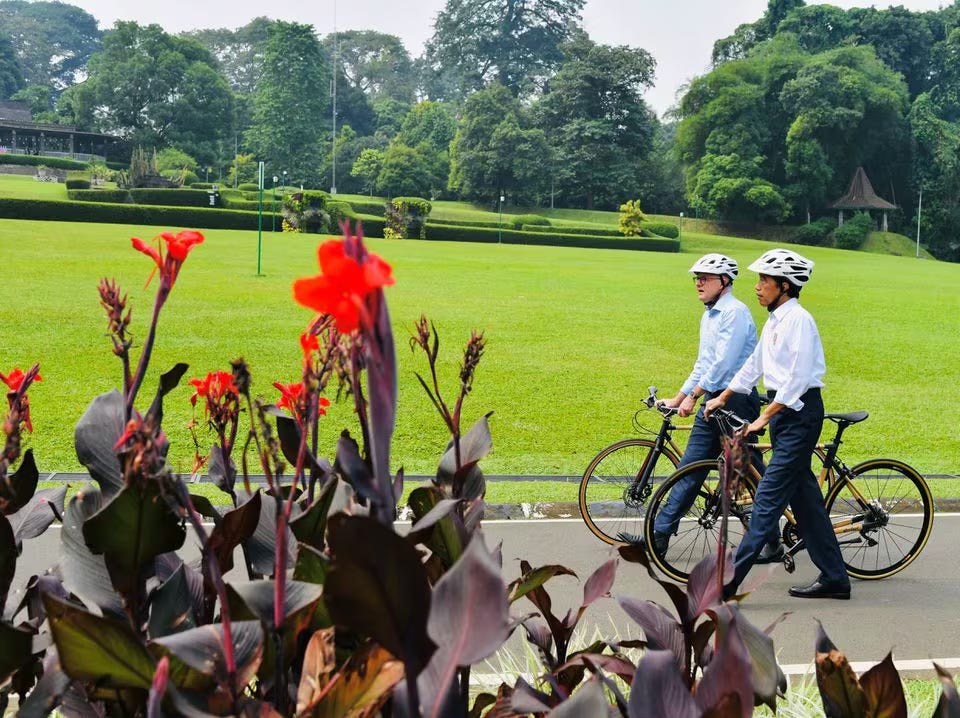
Contemporary Australia and Indonesia share enormous economic, development, industrial, tourism, educational and military complementaries. China’s conduct has helped to accelerate and deepen the strategic relationship to the point where, for the first time in history, Indonesian fighters flew in a B-52 (N) bomber Taskforce flying from Australian bases that border Indonesia. For a non-aligned country, this had the appearance of considerable alignment.
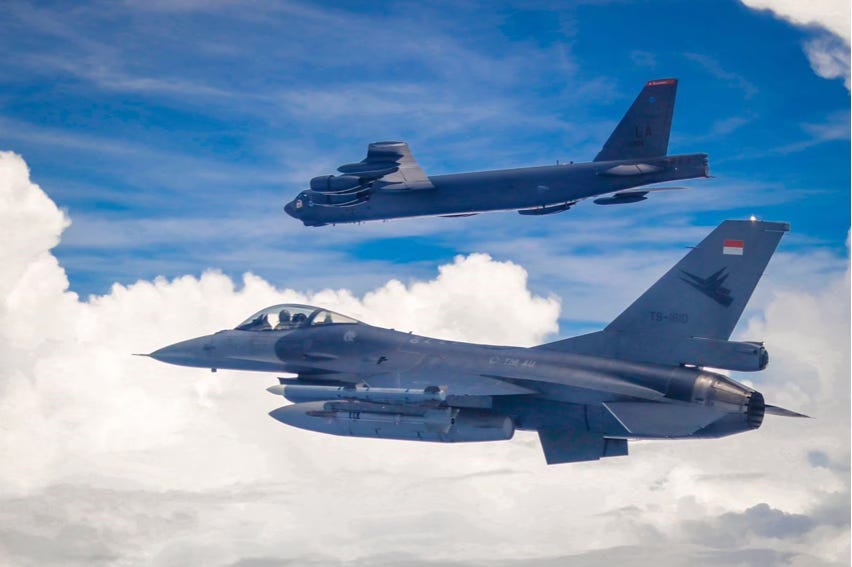
The non-aligned movement was founded in Bandung Indonesia in 1955. It was been a mainstay of Indonesian policy ever since. Increasingly, it has the appearance of being a Cold War relic of decreasing utility especially for those of its members who are now rising powers like India and Indonesia. In line with Chinese aggression, the entire Indo-pacific regional alliance system has been undergoing extraordinary transformation. See
There is a substantial difference between a ‘security and defence cooperation agreement’ and a strategic alliance. Australia and Indonesia have inked the former, in various forms, many times. The latter is a Treaty-based agreement on par with ANZUS or NATO, where each side agrees to defend the other. Of course until its announcement, the status of the new deal will be unknown. Nevertheless, the foreshadowing of this new arrangement suggests Australia is confident that it will be a far more significant deal than the typical exchanges between the two countries in the past.
It may not cross the threshold of a full Treaty with mutual defense obligations - but it will be an essential stepping stone towards one. Third Offset remains convinced that not only is such a Treaty in both countries interests, it is inevitable for a wide range of reasons, from mutual compatibilities to the unifying role China is playing in the region - unifying opposition to its hypernationalism, bellicosity and provocations. A critical additional element is the growing likelihood that America’s role in the world is about to change irrevocably.
Indonesia-Australian relations have come a long way
Things started well when Australia supported Indonesia in its war of independence from the Dutch immediately after WWII. This was a highly unorthodox move by the former British colony that did not sit well with its ‘great and powerful friends’. Thats the thing about geography, it can make you do things others do not expect. The Foreign Minister, Dr HV Evatt, understood the moral reality and political inevitability of Indonesia’s future and decided to put Australia on the right side of that history. In so doing, he did a great service to his country.
As noted above, the non-aligned movement started in Indonesia in 1955. At the peak of the Cold War it was inconceivable that countries would not pick sides. Consequently, non-alignment was seen in some quarters as a communist front organization. Decolonization was a period when the West did not always fully grasp the true political intensions of struggling nationalist movements.1 Part of this was by design. Some of the emerging small powers cultivated a sense of ambiguity in order to play the big powers off one another, often resulting in gaining support from both sides. However, that strategy did not always turn out satisfactorily when ideological clarity was demanded in a crisis.
Indonesian President Sukarno was a nationalist, not a communist. The Chinese minority in Indonesia were harshly put down when they were perceived as an internal communist threat. However, much like India, Sukarno’s breathtaking purchases of Russian military equipment and relationships with global communists, contributed to suspicions of Indonesia in Washington, London, The Hague, and especially in Canberra.
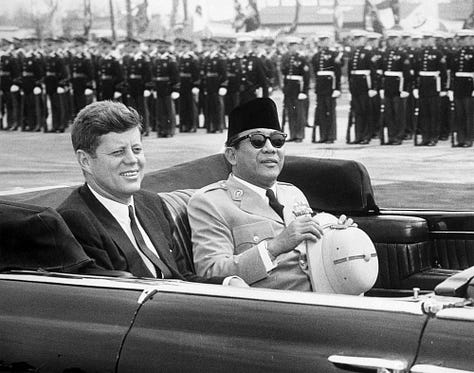
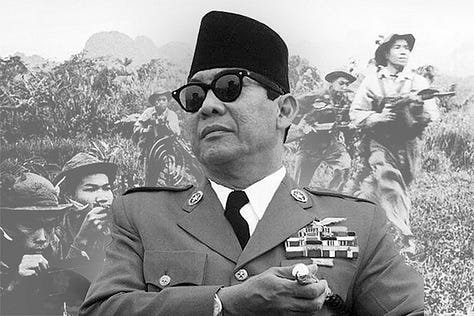
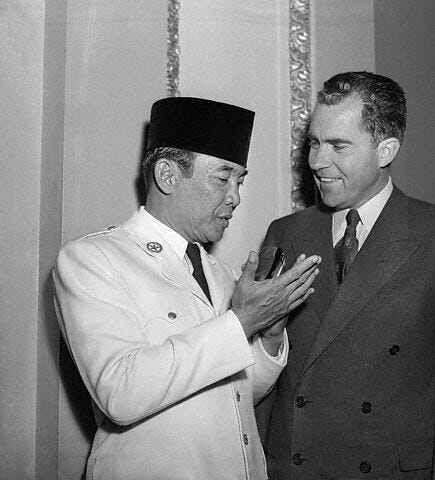
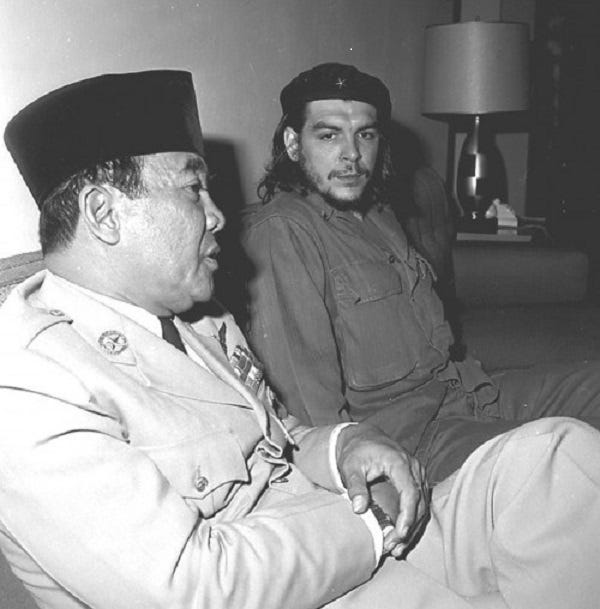
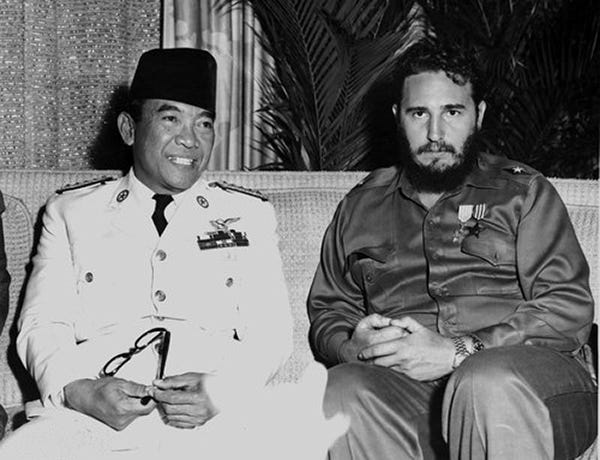
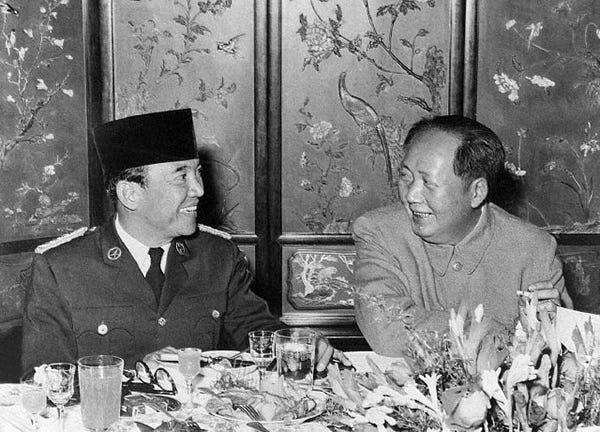
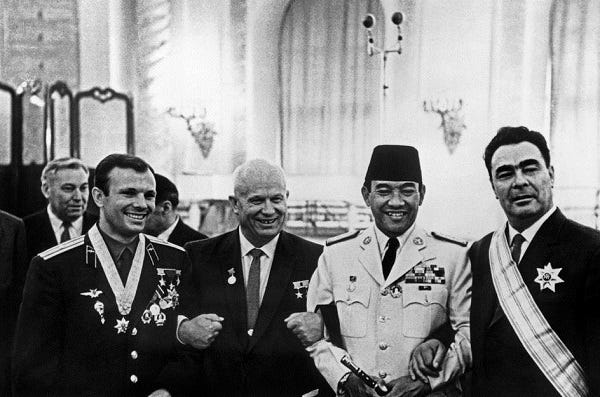
Under Sukarno Indonesia purchased a military order of battle befitting a great-power
Sukarno built the most significant military force in the world outside of Europe and North America. Its order of battle far outweighed anything that Australia or even the UK could bring to the table. He also made more than a token effort to acquire nuclear weapons. To say this caused panic in Canberra is an understatement. Especially in light of the fact that the two countries were engaged in a small war (insurgency) over the creation of Malaysia.
Key Indonesian platforms included
26 x Tu-16 strategic bombers
68 x Il-28 bombers,
31 x MiG 15s,
70 x MiG 17s,
26 MiG 21s,
Sverdlov Cruiser2
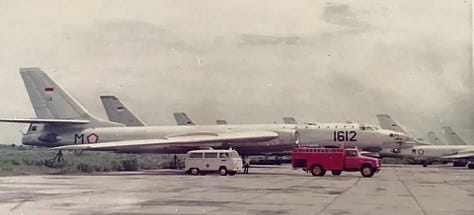
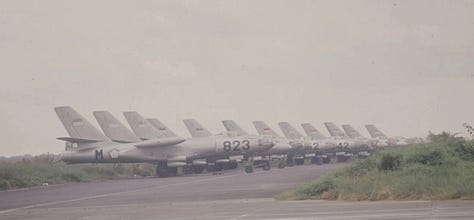
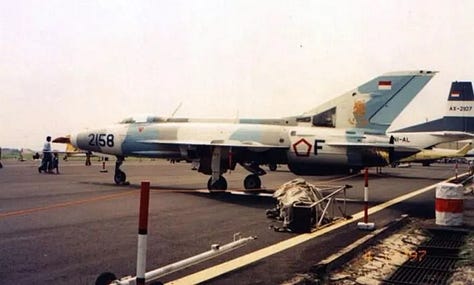
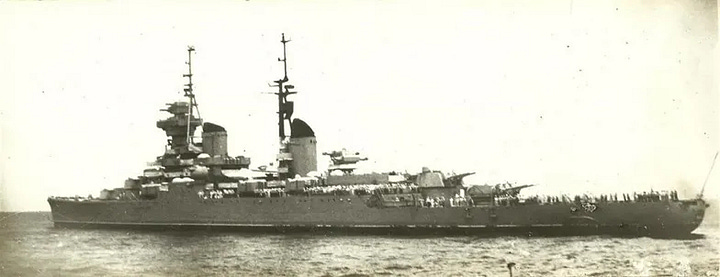
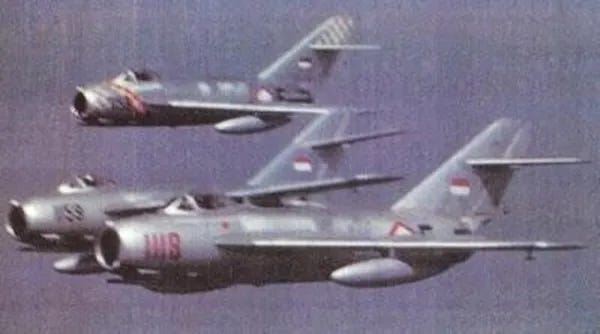
The nuclear capable TU-16 had a radius of 4800 KM enabling it to reach almost anywhere in Australia from the Iswahjudi Air Force Base in Java where the bombers were based.

An Australian Nuclear Program
In May 1957, a WWII fighter pilot turned conservative Senator, John Gorton, told the Parliament that Australia should acquire its own nuclear deterrent, including ICBMs.3 Gorton was not a lone voice in the wilderness. He was a leader in his party, becoming Prime Minister in 1968. Gorton put his nuclear program into action, telling US Secretary of State Dean Rusk that
he didn't trust the Americans to keep their side of the treaty that underpinned Australia's security [ANZUS]. He could not rely on US protection in the event of a nuclear attack. And he wanted the option of developing Australia's own nuclear bomb.4

Gorton’s vision resulted in a decision to acquire the nuclear capable F-111 bomber and the construction of 12 nuclear power plants to fuel the development of a weapons program. A successor government kept the F-111 but scraped the rest. It then went on to normalize the Sino-Australian relationship ahead of Nixon’s opening a year later.

The nuclear weapons programs of Indonesia and Australia, are a truly remarkable and little-known story. The lesson is that diplomatic and military history, treaties, conventions and norms, do not count for much when an existential threat appears on the horizon. Change, unexpected, rapid, and sometimes unimaginable, can happen when the situation demands.
Change, unexpected, rapid, and sometimes unimaginable, can happen when the situation demands.
The Indopacific is on the threshold of just such a moment. China’s rise and America’s retreat is a powerful catalyst behind the creation of a whole new world that is already unfolding before our very eyes. This non-linear change will become more dynamic and uneven if anti-democratic forces succeed in their plans to retake control in Washington.
China’s aggressive rise was expected - America’s collapse into authoritarianism was not
China has been instrumental in forging new alliances among non-traditional partners in the Indopacific in the same sense that Vladimir Putin has been NATO’s salesman of the year.
China’s bellicose rise has coincided with America’s precipitous fall from unchallenged unipolar superpower, to a politically unstable, coup-prone, over-extended, neo-isolationist great power in an unravelling multipolar disorder that it is increasingly unable to influence in the ways it once did.
The end of the post-war liberal world order has been marked by the rapid rise of authoritarianism all around the world. Including in the United States itself. America suffered its first attempted coup in 2021. This deeply shocked its allies and has driven them to scramble to shore-up their positions in the event a second coup is successful. The regime in waiting has made it quite clear it will cancel long-standing security treaties, abandon traditional relationships, and rhetorically at least, has already switched allegiance to the axis of authoritarianism. Post-coup 2.0 it is only a matter of time for policy action to catch up with declaratory statements.
This leaves the freedom-loving countries in the region in a real bind. The Indopacific has no NATO - no regional grouping with an established joint-operations HQ, standing military forces and a security treaty commitment to mutual defense. All of the extant treaties are bilateral between the US and its partners. These include the US-Japan, US-ROK, US-Australia and NZ, the US-Philippines, and to a certain extent, AUKUS.5 Even if America does not formally terminate the treaties (Thirdoffset believes it will for various political reasons), each of these have escape clauses that may be used by either side to excuse itself from honoring the commitment.
The anticipated collapse of the American-led “hub and spokes” system of security alliances in the Indopacific is already driving rapid and unexpected changes in the regional balance of power. America’s regional partners are not waiting to see what happens in Washington. They are all acting on the assumption that the US is no longer reliable. Even the ever-loyal Australians have unexpectedly discovered that a century of unwavering political and military support of American foreign policy turned out not to be such a great insurance policy after all.
"the United States, is no longer the unipolar leader of the Indo-Pacific.” Snapped a recent official statement. “Australia needs to develop the capability to unilaterally deter any state from offensive military action against Australian forces or territory.”6
America’s instability more than China’s unconcealed aggression has pushed America’s allies to dramatically increase their defense spending and to partner with new players outside of the American-led system of security alliances. They expected China to behave erratically. They never imagined America would have an attempted coup and teeter on the verge of authoritarianism. That reality broke the spell of American authority - moral and otherwise. This does not mean they will push America away in the short term, unless Washington does something really unacceptable - always a possibility given the political instability that has consumed the US. There is nothing in it for the allies to make a show of excluding the US or to stop buying American arms. Allies will continue with the appearance of normalcy, trying to gain the most they can before the door is slammed in their faces.
India, Japan, South Korea, Australia, and increasingly Indonesia, will form a pro-democratic rebel alliance if America joins the authoritarian axis. All have been very active in establishing new relationships with one another and other regional countries who fear what China might do in a world without America. The aforementioned Australian Strategic Review does not mince words
"China’s military build-up is now the largest and most ambitious of any country since the end of the Second World War... China threatens the global rules-based order in the Indo-Pacific in a way that adversely impacts Australia’s national interests"
The Australians, South Koreas, Japan and the Philippines, have all pre-positioned themselves for a world without America. Even ASEAN, a multilateral diplomatic grouping that has strenuously avoided hard power issues, has started to explore what military cooperation might look like in the future.
For the same reasons, the prospect of nuclear proliferation among the allies is real and growing. As the article below explains in detail, the allies are making preparations to defend themselves in the knowledge they cannot meet the PLA missile for missile, ship for ship, sub for sub, man for man. Nuclear weapons are ineffective, except for one important outlier mission: deterring invasion.7
An Indo-Australian Alliance
An Indo-Australian Alliance (IAA) would be a formidable barrier to PLA power projection in the South China Sea. Geographically, demographically, militarily, economically, and industrially; the complementarities between Australia and Indonesia are extraordinary. It is a textbook case of the whole being greater than the sum of the parts.
For the PLA, Indonesia’s 17000 islands stretching across 3181 miles (double the distance of London to Moscow), could be made into a maze of obstacles, chokepoints and pitfalls, across the full breadth of the South China Sea’s southern flank. Conversely, for the Indo-Australian alliance, the archipelago offers extraordinary operational versatility, with endless opportunities for using diverse/dispersed locales for power projection, A2AD, hit-and-run, concealment and deception operations across Australia’s northern flank.
The ADF has, or is acquiring, power projection capabilities that, were they staged forward on Indonesian soil, would range deep into China’s southern area of operations and impose significant and unwelcome military dilemma’s on Chinese decision makers. The Indonesian military has manpower, but its order of battle lacks cohesion, sophistication, and jointness. The Australian Defense Force (ADF) has exactly the reverse configuration. It has a small army but the regions most advanced joint military forces outside of the US and Japan. This is not to say the Indonesian navy and air force have nothing to offer. For example, Indonesia’s flotilla of fast missile boats will likely deliver a surprise to the PLA-N, much like the Royal Navy was taken by surprise by the Argentinian use of Exocet missiles.
Australia offers the alliance strategic depth stretching for thousands of miles in every direction south of the line. It is not until you get to the further-most points in the rear that you find Australia’s major cities. Between the long Indonesian front and Australian cities lies a buffer zone comprising some of the most inhospitable territory on earth. While Australia has natural resources, a manufacturing base and industrial-military infrastructure hidden far from reach behind that buffer, at 25m its population is comparatively small. Indonesia, by comparison, and in absolute terms, has phenomenal manpower at its disposal for civilian and military applications.
Indeed, as the world’s fourth most populous nation, Indonesia will be no push over for the Chinese under any scenario. Should the Chinese occupy any part of Indonesian territory, for just one example, an insurgency supported from Australia could last indefinitely. There is historical precedent for this claim. Sparrow Force, a battalion sized (~1800) stay-behind commando riding group comprised of Australian, British, and Dutch military units working by, with and through, the indigenous people, and resupplied from Australia, managed to tie down a Japanese division (12,000) on Timor for six months after the initial invasion. The Japanese commander Lieutenant General Yuichi Tsuchihashi, who had decimated all other resistance, threatened the force with the comment that "you alone do not surrender to us". Of course that became a famous epithet worn with pride, especially after it was highlighted by Churchill in honor of the achievements of Sparrow Force. Indonesian territory offers 17,000 Sparrow force opportunities against a great power engaged in illegitimate occupation operations at the end of extended and exposed sea lines of communication.
Jakarta is home to the ASEAN secretariat which is indicative of the leadership role it plays in SE Asia. A strong vibrant democracy with a fast growing economy and a workforce that has benefited from decades of exports of Australian high education, the values of the two countries have more in common than ever before. This does not mean there will not be tensions and the occasional crisis. There are a number of extant sticking points in the bilateral relationship. But those tensions pale in comparison to the looming threat posed by an aggressor PRC in a world without America or with America allied with the axis.
Some might reject the notion of an Indo-Australian alliance as going way beyond natural limits set particularly by religion and history. These are not invalid concerns. However, the enemy of my enemy principle can do a lot to overcome historical barriers to cooperation. Britain and France were at war for centuries but they came together to resist Nazi aggression. Few recall that Churchill proposed a Franco-British Union on June 16, 1940 as the Nazi’s closed in on their objectives in France.
This union was to be based on common citizenship, a formal association of the two Parliaments and joint organs of defence, foreign, financial and economic policies. A single war cabinet was to be entrusted with the direction of the British and French forces. In short, this was a proposal for the amalgamation of the two states into a single Franco-British Union.
This was an extraordinary offer and had the French more time perhaps they might have seen greater value in it than they did at the time. Either way, the greater point is that centuries of competition, if not outright enmity, can be overcome under the right conditions. Moreover, the Indo-Australian relationship can hardly be characterized as having a contested a history on a par with that between Britain and France. On the contrary, from its founding and especially since the 1990s, Australia and Indonesia have shared a close and mutually beneficial relationship. There have been tensions but they have not altered the course of the overall trajectory - toward partnership between Jakarta and Canberra.
Unprecedented changes in the world order, especially among the axis of authoritarians and their largely successful conduct of a hybrid world war, have upended the strategic balance of power and caused non-traditional partners to bandwagon for mutual security. This is happening all over the Indopacific and makes special sense between Indonesia and Australia given the deep complementarities between the two countries. Current negotiations of a new security agreement may fall short of a formal treaty on the level of ANZUS - but it almost certainly will help pave the way to one in the future. As China continues its belligerence and as America shreds its constitution in its descent into a new dark age where the shining light on the hill is extinguished by dictatorship, it would be a surprise if Australia and Indonesia did not deepen their relationship accordingly.
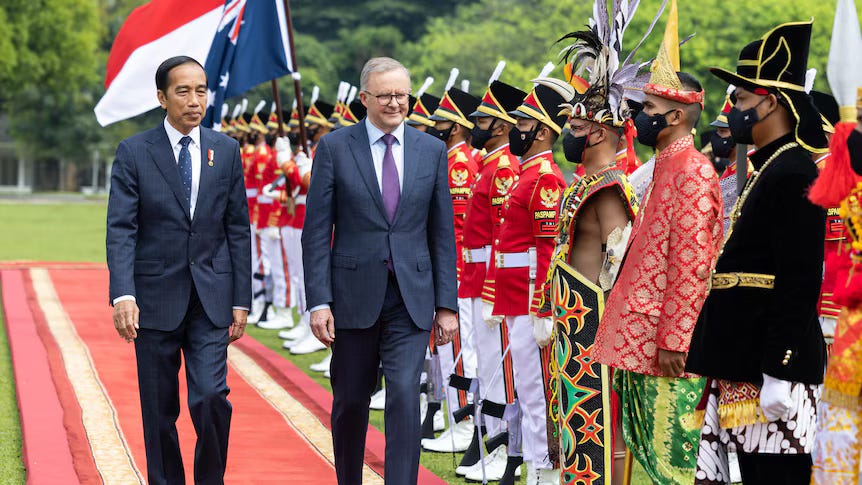
Update - 30 Sep 2024
Indonesia’s president-elect Prabowo Subianto, who also serves as defense minister, signed the Defense Cooperation Agreement with Australian Defense Minister Richard Marles at Indonesia’s National Military Academy in Magelang, Central Java province.
Marles said the agreement, whose text has not been published, is “an important piece of international architecture, a treaty-level agreement” but not a military alliance. He added that the two countries plan to hold the largest joint military exercise in their history in November, which will be Australia’s largest overseas exercise of the year.
The bilateral relationship is becoming increasingly important to Australia in face of growing tensions with China in the region. New Australian prime ministers typically make Jakarta one of their first overseas destinations.
Subianto has vowed to continue Indonesia’s long-standing policy of non-alignment as president.
“We did it to work together, as neighbors who are in direct contact, to increase cooperation to help each other overcome various security threats and promote sustainable peace and stability in the Asia Pacific region,” Subianto said on Thursday.
Australia’s defense ministry said that the agreement will include “enhanced practical cooperation and interoperability between our defence forces in areas such as maritime security, counter terrorism, humanitarian and disaster relief, logistics support, education and training, as well as across defence industry.”
“The defense cooperation agreement between our two nations is the deepest. It’s the the most significant defense agreement in the history of our bilateral relationship,” Marles said on Thursday.
Indonesia’s Defense Ministry said that the agreement that would help prevent future security threats in the Asia-Pacific region through collaborative efforts to maintain peace and stability.
It should be noted that the West encouraged nationalist-based resistance against the Japanese. The Atlantic charter was a promise by the Great Powers to abide by self determination. However, the exigencies of the communist threat caused the West to renege on these promises, which caused so mush frustration, resentment and wars of nationalist liberation that were, in turn, perceived as communist struggles. Of course the communists were not eager to set the record straight and nor were the locals if it made both sides contribute to their struggles.
Hancock, Ian (2002). John Gorton: He Did It His Way. Hodder.
This is not a one off event. In something Third Offset is curious about but does not have the time to investigate, is a long line of Australian Prime Ministers of both parties have turned on America after they leave office. These were all staunch alliance supporters when in office. There is a sense from their comments that each one felt betrayal
AUKUS is a treaty to cooperate on defense technology sharing not to offer mutual aid in the event one of the parties is attacked. Nevertheless, as one of President Biden’s landmark achievements it is sure to scrapped if there is a change in Washington. The deal will be painted as “giving” American submarines away which will be interpreted as contrary to putting America first, despite the reality that the net result will be making Australia pay for and maintain the subs resulting in additional hulls in the water given US maintenance and production backlogs.
Knowing it and declaring it so publicly are two different things. To anyone who knows the Australian DOD scene this is a truly remarkable statement. It is 100% accurate and the public deserve to know what the government is thinking. Evidentially, the Australian government see the current period as a time of flux, likely preceding a crisis. It is a bold and unprecedented statement. It should have rung alarm bells in Washington but it was not even noticed as political bandwidth is soaked up with all of the issues causing concern to Canberra.
And some attack scenarios.


